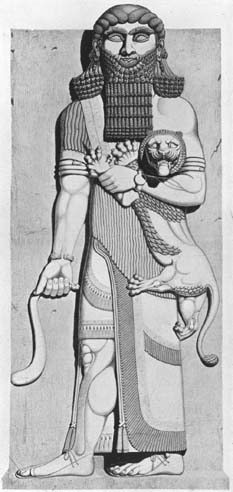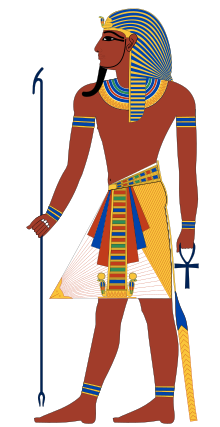For this chapter you have to of read the book to understand the questions...the tablets are long so this week we can go through tablets 1-5 and I'll post questions on Saturday.
I could not find my exact copy on the internet, my copy is a really good one. I like the words it uses, but I found this one on an online encyclopedia.
Tablet 1:
Column 1
Fame haunts the man who visits Hell,
who lives to tell my entire tale identically.
So like a sage, a trickster or saint,
GILGAMESH
was a hero who knew secrets
and saw forbidden places,
who could even speak of the time before the
Flood because he lived long, learned much,
and spoke his life to those who first
cut into clay his bird-like words.
10. He commanded walls for Uruk and for Eanna,
our holy ground,
walls that you can see still; walls where weep
the weary windows of dead soldiers.
Go to them and touch their immovable presence
with gentle fingers to find yourself.
No one else ever built such walls.
Climb Uruk's Tower and walk abut on a
windy night. Look. Touch. Taste. Sense.
What force created such mass?
20. Open up the special box that's hidden in the wall
and read aloud the story of Gilgamesh's life.
Learn what sorrow taught him; learn of the those
he overcome by wit or force or fear as he,
a town's best child, acted nobly in the way
one should to lead and acted wisely too
as one who sought no fame.
Child of Lugal banda's wife and some great force,
Gilgamesh is a fate alive, the
finest babe of Ninsun, she who never
30. let a man touch her, indeed
so sure and heavenly, so without sin.
He knew the secret paths that reached the eagle's
nest above the mountain and and knew too how
just to drop a well into the chilly earth.
He sailed the sea to where Shamash comes,
explored the world, sought life, and came at last
to Utnapishtim far away who did bring
back to life the flooded earth.
Is there anywhere a greater king
40. how can say, as Gilgamesh may
"I am supreme"?
Column 2
The bigger part of him was made in heaven
and the smaller part somewhere on earth.
She-who-must-be-obeyed fashioned his body's self.
She endowed him.
Gilgamesh watches the flocks of Uruk himself
as if he were a loose bull, nose up in open field.
No one else could come close to fighting like that.
His clan is roused by howling dreams
50. And with them all he goes howling through sanctuaries.
But would he ever let his child come
To see him ravish others?
"Is this shepherd of Uruk's flocks,
our strength, our light, our reason,
who hoards the girls of other men
for his own purpose?"
When Anu in the sky heard this,
70. he said to Aruru, great goddess of creation that she is:
"You created humans; create again in the
image of Gilgamesh and let this imitation be
as quick in heart and as strong in arm
so that these counterforces might first engage,
then disengage, and finally let Uruk's children
live in peace."
Hearing that, Aruru thought of Anu. Then she
wet her creative fingers, fashioned a rock, and tossed it
as far as she could into the woods.
80. Thus she fathered Enkidu, a forster, and gave birth
in terror and in fright without a single cry of pain,
bringing forth another likeness of Ninurta, god of war.
Hair covered his body and his curls resembled
those of any good girl, growing swiftly like the
fair hair of Nisaba-giver-of-grain.
This Enkidu had neither clan nor race. He went
clothed as one who shepherds well, eating the food
of grass, drinking from the watery holes of herds
and racing swift as wind or silent water.
90. Then Enkidu met a hunter at the watery hole
on three consecutive days.
And each time the face of the hunter signaled
recognition of Enkidu.
Ror the herds were uninvited at
the hunter's oasis and the hunter was
disturbed by this intrusion. His quiet heart
rushed up in trouble. His eyes darkened.
Fear leaped forth onto a face that looks
as if it expects to doubt for a long, long time.
Column 3
100. Then with trembling lips the hunter told his father this complaint:
"Sir, one has come to my watery hole from afar and he
is the biggest and best throughout the land. He feels power.
His is a strength like that of Anu's swift star, and
tirelessly does he roam across the land.
He eats the food of beasts and, like the beasts,
he comes at will to drink from my watery hole.
In fear do I see him come to undo
what I have done by wrecking traps, by
bursting mounds, by letting animals slip through my
110. grasp, beasts that I would bind."
Then with hateful lips, the father told the hunter his reply:
"Boy, your answer lies in Uruk where
there stalks a man of endless strength named Gilgamesh.
He is the biggest and best throughout the land. He feels power.
His is a strength like that of Anu's swift star.
Start out toward Uruk's ancient palace
and tell your tale to Gilgamesh.
In turn he'll say to set a trap, take back with
you a fine lover, some sacred temple girl,
120. who might let him see what force and charm a girl can have.
Then as Enkidu comes again to the watery hole,
let her strip in nearby isolation to show him all her grace.
If he is drawn toward her, and leaves the herd to mate,
his beasts on high will leave him then behind."
The hunter heard his father well and went that very night
to Uruk where he said this to Gilgamesh:
"There is someone from afar whose
force is great throughout our land.
130. His is a strength throughout the land. He feels power.
His is a strength like that of Anu's swift star, and
tirelessly does he roam across the land.
He eats the food of beasts and, like the beasts,
he comes at will to drink from my watery hole.
In fear do I see him come to undo
what I have done by wrecking traps, by
bursting mounds, by letting animals slip through my
grasp, beasts that I would bind."
So Gilgamesh replied:
"Go set a trap; take back with
140. you a fine lover, Shamhat, the sacred temple girl,
who might let him see what charm and force a girl can have.
Then as Enkidu comes again to the watery hole,
let her strip in nearby isolation to show him all her grace.
If he is drawn toward her, and leaves the herd to mate,
his beasts on high will leave him then behind."
The hunter returned, bringing with him the sacred temple girl,
and swift was their journey.
Three days later, at the watery hole, they set their
trap for Enkidu and spoke no word for two
150. whole days waiting and waiting and waiting.
Then the herd came slowly in to drink.
Column 4
Beasts arose and sleepy limbs began to flutter then.
Enkidu, the boy who walked on mountains,
who eats the food of beasts and, like the beasts,
comes down at will to drink from the watery hole,
with the beasts arose and stretched
his tired limbs to start the day.
She beheld him then, as he was in his beginning,
the one who gave and took life from the far woods.
160. "Here is he, fine lover; be set to wet him with
your tongue and chest and loins.
Spread forth your happiness. Display your hidden charm.
jump him fast and kneel upon his shoulders.
Without his wind then, he'll enter near your entrance.
Take off your robe to let him in.
Let him see what force a girl can have.
The friends he has from on wild will exile him
if he presses his person, as he will, into your scented bush.
" Shamhat let her garments loose and spread forth
170. her happiness which Enkidu entered as gusts of wind
enter tunnels bound for Hell.
Hot and swollen first, she jumped him fast
knocking out his rapid breath with
thrust after loving thrust.
She let him see what force a girl can have,
and he stayed within her scented bush for
seven nights, leaping, seeping, weeping, and sleeping there.
After that week of pleasure,
Enkidu returned to the herds
180. but the beasts fled from him in haste.
They stampeded away from his new self.
He could no longer race as he had once,
legs soft now and ankles stiff. The beasts
left him behind and he grew sad
that he could no longer speed with them.
But he enjoyed the memory that no virgin has
and, returning to his fine lover, he once
more knelt between her legs
as she spoke these words to him:
190. "Now you are as if a god, my boy,
with no more need of dumb beasts, however fair.
We can now ascend the road to Uruk's palace,
the immaculate domicile, where Anu and Ishtar dwell,
and there we will see Gilgamesh, the powerful,
who rides over the herd like any great king."
These words he heard and he stared at her.
For the first time he wished for just one friend.
Then Enkidu asked the love who was so fine:
"Please come with me and be my love
200. at the immaculate domicile, where Anu and Ishtar dwell,
and there we will see Gilgamesh, the powerful,
who rides over the herd like any great king.
I wish to call on him; to proclaim all things
aloud and find a friend in him."
Column 5
Enkidu continued:
"Uruk will hear me say, 'I am the strongest.
I alone can do all I wish.'
Forester that I am, a mountainous power is mine.
210. We should march together, face-by-face,
so I can promote your fame."
Then fine lover said these words in invitation:
"Enter Uruk of the herds, Enkidu,
where costumes bright are worn,
where it is always time to party,
where merry music never fades,
where graceful girls do ever play
with toys and boys and men;
for in the night these revelers do
their best to rule the town.
220. There, with a smile, Enkidu
will see his other self, great Gilgamesh.
Watch him all, please. Note his
face, his fists, his fairest sword,
and all the strength that dwells in him.
Could he be greater than you,
this one who's up and down all day and night?
Fear your own anger, boy; for great Gilgamesh
adores fair Shamash and is adored in turn.
Anu of the blue sky, Enlil from the clouds
230. and clever Ea have empowered him.
And before he even sees you,
this great Gilgamesh will have first envisioned you
in Uruk as a rival in a dream."
Gilgamesh awakens to ask his mother, Ninsun,
to leave off the dream.
"Mother," says he, "I saw a star
within my head in sleep just now
that fell at me like Anu's dart
and I could not escape.
240. Uruk was on high of it,
our people did applaud,
and gathered Lip to praise his force.
Men clenched fists; women danced.
And I too embraced this rising star,
as a man does the woman he loves best,
then took the new one here to you
so that you could see us both at once."
Gilgamesh's mother, who is wise in all and worries not, replied:
"This bright, new star is your true friend
250. who fell at you like Anu's dart,
whom you could not escape."
Column 6
Then she who is wise in all and worries not continued:
"So say this friend is one who is almighty,
with strength renowned around the world,
like Anu's dart his force is real
so that he draws you in, as does a wife,
though he is sure to race away, like
that most distant star, with the secrets of your origin.
This dissolves your sleep."
260. Then again, Gilgamesh said to her in reply:
"Mother, I slept when some with axes then
attacked the herds of Uruk."
So Ninsun reassured the frightened king:
"Enkidu will help.
He will guard his loves
or rescue them from danger;
he is your most faithful friend.
Expect him to shepherd you
and to be sure that all goes well."
270. Gilgamesh said to his fond source:
"I pray for fortune and for fate
to send me such a one
that I may have a friend who's as kind
and patient as a brother."
Then in sleep full of repose
the temple girl enchanted Enkidu
where they lay smiling.

















